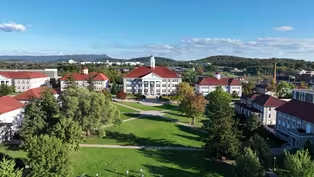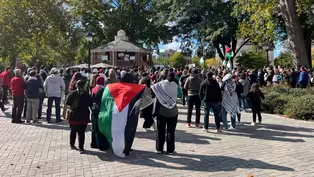VPM News Focal Point
Israel-Hamas War: Origins and Potential for Escalation
Clip: Season 2 Episode 18 | 7m 15sVideo has Closed Captions
The origins of the war between Israel and Hamas and the potential for a growing conflict.
People continue to die as the war between Israel and Hamas enters its fourth week. Ariel Ahram, chair of Virginia Tech’s Government and International Affairs program discusses the origins of the conflict, the growing regional tensions and what to expect over the coming weeks and months.
Problems playing video? | Closed Captioning Feedback
Problems playing video? | Closed Captioning Feedback
VPM News Focal Point is a local public television program presented by VPM
The Estate of Mrs. Ann Lee Saunders Brown
VPM News Focal Point
Israel-Hamas War: Origins and Potential for Escalation
Clip: Season 2 Episode 18 | 7m 15sVideo has Closed Captions
People continue to die as the war between Israel and Hamas enters its fourth week. Ariel Ahram, chair of Virginia Tech’s Government and International Affairs program discusses the origins of the conflict, the growing regional tensions and what to expect over the coming weeks and months.
Problems playing video? | Closed Captioning Feedback
How to Watch VPM News Focal Point
VPM News Focal Point is available to stream on pbs.org and the free PBS App, available on iPhone, Apple TV, Android TV, Android smartphones, Amazon Fire TV, Amazon Fire Tablet, Roku, Samsung Smart TV, and Vizio.
Providing Support for PBS.org
Learn Moreabout PBS online sponsorshipKERYIS MANZANARES: Now we turn back to the Israel-Hamas War with our guest Ariel Ahram who is a professor and chair of the Government and International Affairs Program at Virginia Tech.
His most recent book is "War and Conflict in the Middle East and North Africa," where he explores the causes for fighting in that part of the world.
Thank you for joining us.
We'd like to get started with where we are right now in the Israel/Hamas War.
What's been happening this week?
ARIEL AHRAM: On the military front, Israel is accelerating its ground assault and ramping up aerial and artillery attacks against Hamas strongholds in Gaza.
Hamas and Palestinian Islamic Jihad are continuing to launch rockets at Israeli cities.
Meanwhile, the humanitarian situation in Gaza is worsening by the hour.
Israeli attacks have pulverized apartment buildings, hospitals, and other vital infrastructure.
There are calls in Europe and the Islamic world for Israel to adopt a cease fire.
A small number of wounded Palestinians and those holding foreign passports are being allowed to leave Gaza for Egypt.
The U.S. remains Israel's key ally and supporter but has become noticeably wary of escalation and is putting pressure on Israel for restraint.
KERYIS MANZANARES: What sparked this round of violence?
ARIEL AHRAM: This round of terrible violence began on October 7th when Hamas launched a surprise attack from Gaza into Southern Israel.
Hamas fighters targeted both Israeli military bases and civilian towns.
They killed over 1,200 and took 200 hostages, including citizens of Israel, the U.S., Britain, France, Germany, Thailand, and elsewhere.
KERYIS MANZANARES: This is a very complicated issue, but if we were to boil it down, what is this conflict about and what are the origins?
ARIEL AHRAM: There's a lot of mythology and self-serving narratives about the origins of the Israeli-Palestinian conflict and who is responsible for it.
Some people try to trace it back to the Bible or to the Quran, but framing this as an ancient conflict is unhelpful, and I think historically inaccurate.
About 100 years ago at the turn of the 20th century, Jewish and Arab Palestinian nationalist movements claimed the same territory as their homeland, including the holy sites of Jerusalem.
The state of Israel was established in 1948 as a Jewish homeland.
Palestinian efforts to establish a state of their own have failed thus far.
There are many people in both the Jewish and Palestinian communities and key international supporters who believe that their homelands are indivisible, and they can't be shared with others.
KERYIS MANZANARES: What is the goal for both the Israeli government and Hamas?
ARIEL AHRAM: Part of what makes the conflict so dangerous is that neither side has a clear strategic objective, a stopping point at which they would stop fighting.
Hamas's espoused doctrinal objective, embedded in its charter is genocidal, to destroy Israel in the course of establishing an Islamic Palestinian state.
Hamas claims that the October 7th attack was a response to Israel's capture of Hamas operatives and to Israel's attempts to lay claim to parts of Jerusalem, but its actions were heedless of the risk to civilians, both Israeli and Arabs.
Moreover, it was not approved by the Palestinian authority, which rules parts of the West Bank and enjoys the far greater international legitimacy.
On the Israeli side, Prime Minister Bibi Netanyahu formed a unity government with his bitter political foes, but there's no unanimity on the agenda.
At a minimum, Israel seeks to dismantle Hamas in Gaza and save the hostages, but there are factions within the Israeli government who want to launch a wider assault on Palestinians in Jerusalem and the West Bank, and to reckon with Iranian backed groups like Hezbollah and Lebanon which could pull in others into the war.
KERYIS MANZANARES: And who are the other players in this war and what are their interests?
ARIEL AHRAM: This war is becoming widely regionalized and internationalized.
The U.S. is Israel's most important ally and has provided military support and diplomatic support to Israel in this crucial time of need.
On the other side, Hamas is backed by Iran, but is not really a direct proxy.
Iran has a network of of military groups that it supports in opposition to Israel.
There are also regional players: Syria, Saudi Arabia, Qatar, the UAE, Turkey, and Egypt that all have an interest in the conflict.
China has also been trying to identify itself as a negotiator and ambassador with little success.
I think one of the big concerns is that outside players may be pulled into the conflict, taking what had been, what is a relatively local conflict and turning it into a region-wide one.
KERYIS MANZANARES: We've seen protests and violence against Jews and Palestinians here in the United States and around the world.
What's the potential for this conflict to spread?
ARIEL AHRAM: There are significant Jewish and Palestinian diasporas across the United States, in Europe and elsewhere in the world, and they all feel to have effective connections and emotional connections to their homeland.
It's unfortunate that groups are trying to incite each other far from the conflict.
I think that there is a real chance of escalation outside of the conflict within cities like New York, Los Angeles, London, Berlin, and that could have a spillover effect making the overall conflict harder to resolve.
KERYIS MANZANARES: President Biden has stated the United States is still in support of a two-state solution.
Do you think that that's possible?
ARIEL AHRAM: The two state solution remains, in my opinion, the best hope for a sustainable peace, but it's a very distant hope at the moment.
The alternatives though, are either war or a one state solution, a unified state, and that seems even less likely.
KERYIS MANZANARES: What should we expect to see over the next weeks and months in this war?
And do you think that there can be peace in this region?
ARIEL AHRAM: Unfortunately, in this case, in the Israel-Palestinian conflict going on right now in Gaza, the violence is probably going to accelerate at least for the next few weeks and maybe months, and it's not going to end anytime soon.
I should stress though that the region as a whole has peace in different forms.
There's a misconception or a stereotype of the Middle East as somewhere that's always on fire, always violent, and in fact that's not the case.
There are lots of areas of peace, peace that forms in local communities, peace that forms at districts and sub-districts and provinces, and sometimes peace between states.
Just a few months ago we had this, there were a lot of discussions about Israel's efforts to come to a peace treaties with Saudi Arabia and the Abraham Accords between Israel, the UAE, Bahrain and Sudan.
Those are examples of peace.
I think what we know though is that the peace of the Middle East is fragile and is maybe more fragile than in other regions and is more prone to being overturned.
We have to be really careful and attentive to the role of spoilers who don't see peace as being in their interest.
KERYIS MANZANARES: Thank you.
Thank you so much for joining us today.
ARIEL AHRAM: Thank you.
Campus Free Speech in Virginia
Video has Closed Captions
Clip: S2 Ep18 | 3m 27s | Where does a student’s right to protest on campus and a speaker’s right to speak collide? (3m 27s)
Video has Closed Captions
Clip: S2 Ep18 | 4m 26s | Two women, guided by their faith, end up on different sides of the debate over abortion. (4m 26s)
Impact of Israel-Hamas War on Virginians
Video has Closed Captions
Clip: S2 Ep18 | 2m 19s | Virginians are reacting to the Israel-Hamas War by exercising their right to protest. (2m 19s)
The Right to Bear Arms vs. The Right to Public Safety
Video has Closed Captions
Clip: S2 Ep18 | 5m 47s | When rights collide over gun ownership versus gun control, a look at the gun debate. (5m 47s)
Providing Support for PBS.org
Learn Moreabout PBS online sponsorship
- News and Public Affairs

Top journalists deliver compelling original analysis of the hour's headlines.

- News and Public Affairs

FRONTLINE is investigative journalism that questions, explains and changes our world.












Support for PBS provided by:
VPM News Focal Point is a local public television program presented by VPM
The Estate of Mrs. Ann Lee Saunders Brown



